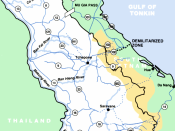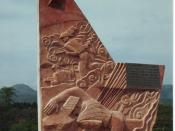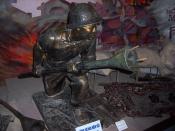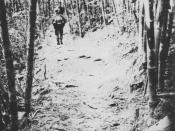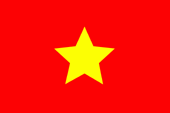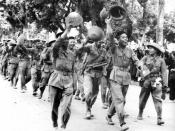Why did the United States Withdraw From the Vietnam War? The United States withdrew from the Vietnam War for several reasons. The Army had to fight in unfamiliar territory, was lacking in moral, were not prepared for the conditions, could not shut down the Ho Chi Minh Trail, and were untrained to respond to guerilla warfare. This combination of disadvantages and the loss of public support led to the United States withdrawing from Vietnam. The United States Army was forced to fight in a new land that had different weather and geography than the U.S., and put the army at a disadvantage from the beginning of the war. Vietnam is a very hot, tropical country, as it is fairly close to the equator. It has jungles over most of the land, bit also has a cool mountainous region. The monsoon in Vietnam can last for several months, which adds to the misery of the troops.
During this time, diseases flourished which are not normally contracted in the U.S. Some of these were ringworm, dysentery, trench foot, and trench mouth.
Clothing also did not last very long. "Clothing rotted and tore apart if worn for more than three or four days." In a less harsh climate, this would not have been a problem. The mountains were a hard place to fight. The army had a hard time hauling all their gear and weapons, which made each mission take longer. The climate was different than in the valleys, so different equipment was needed. The most difficult places to fight were the jungles. The jungles were hot, humid, and generally uncomfortable due to the volume of bugs and snakes, which seemed to bite the soldiers whenever they could. The dense jungles were a good place for the Viet Minh to hide. "Soldiers faced an enemy who was sometimes hidden, sometimes within arm?s length." The U.S. soldiers found it hard to see the Viet Minh, who blended in to the jungle, and moved stealthily, but the Viet Minh could see the soldiers in their bulky outfits.
The U.S. soldiers were not properly equipped for fighting in Vietnam. They were overequipped. This slowed them down and made them easy targets. They carried everything they would need, and wore heavy combat boots, flak jackets and helmets in case they were hit with a bullet. The Viet Minh traveled light, and placed things where they could be retrieved quickly. Instead of wearing protection, they planned not to get shot. For supplies they would just hide them, or get them from the many villages that secretly helped them. Many of the Vietnamese people sided with the Viet Minh at night. They would appear peaceful and innocent to the soldiers who patrolled the villages, and would then give supplies to the Viet Minh.
They also helped to maintain the Ho Chi Minh Trail. The Ho Chi Minh trail was a network of paths leading through the jungles of Vietnam. It was originally a route used by smugglers to ferry opium to and from Vietnam. The Viet Minh used it so that supplies could be secretly transported under the safety of the jungle canopy, from North Vietnam to South Vietnam to the fighters operating there. The trail snaked through Laos and Cambodia, to help confuse the U.S. army. It was very hard to find, and therefore it was very hard for the U.S. to stop the flow of Viet Minh supplies. Even if the U.S. could successfully damage a section of the trail, there was an army of about three hundred thousand peasants, who used shovels to repair the damage. These people spent their time improving the trail when there were no repairs to be completed. This trail was the center of the United States problems, and not being able to destroy this prolonged the war for many years.
This continuance of the war lead to ebb in the moral of U.S. troops. When the U.S. would win a battle, the Viet Minh would not lose hope. Even after losing forty thousand troops in one battle, the Viet Minh still kept fighting. The Viet Minh were fighting for freedom, and they had passion. The Viet Minh leader summed up their attitude by saying "You can kill ten of my men for every one of yours, but even at those odds, I will win." The Viet Minh were fighting to unite Vietnam, while the U.S. soldiers were fighting because they had been drafted. They just wanted to survive and go home. They would not have to face any direct consequences of losing the war. The Viet Minh, however, were fighting for a cause, and used much the same tactics as the United States in their war for independence. The American Revolution used guerilla warfare tactics to defeat the superior power of the British army. The U.S. could have taken from this experience, and perhaps fared better in Vietnam.
The United States battle tactics did not fare well against an unseen enemy, who rarely presented himself in a full-scale battle, but rather picked at units one by one. A conversation between a colonel in the U.S. army and a colonel in the Vietnamese communist army summed up the guerilla warfare tactics used: "You know you never defeated us on the battlefield," said the American Colonel. The North Vietnamese Colonel pondered this remark for a moment. "That may be so," he replied, " but that is also irrelevant." The revolutionaries in Vietnam used hit and run attacks. They would assault small groups of soldiers, by sneaking up on them. This worked well, because it allowed the Viet Minh to avoid bigger battles, which they were not trained for. They knew that the U.S. soldiers were unfamiliar with the battlegrounds and jungles, so they used this weakness to their advantage, by being able to move more quickly and stealthily than the U.S. troops. They also knew how to blend with the terrain, which was good for surprise attacks, which would instill confusion into the enemy troops. The Viet Minh also used fear tactics to distract their enemy from the war. Even before the war broke out, they planted bombs that would be triggered by U.S. advisors. These booby traps would be placed where they were unexpected, and instead of killing, they would harm the advisors, by taking out an eye, or blowing of a leg, or other crippling injuries. Other scare tactics included road blocks, where non Viet Minh were killed, or blowing up a restaurant where foreigners would be killed by the blast. Booby traps were also used in the jungles to hinder American troops. They ranged from homemade booby traps, like bamboo spikes in its, covered by leaves, to logs that were dropped on the enemy, to explosives. They would set up a tripwire that was attached to a grenade, and would explode, injuring many soldiers. There were also mines implanted in paths, as well as guerillas that sat along the trail and would trigger a bomb with a remote firing mechanism. Most booby traps came from the thousands of dud bombs that were dropped from American planes. Up to 20,00 pounds of explosives were recovered per year by scavengers after U.S. bombing raids. These explosives could easily be converted into weapons.
The Viet Minh also camouflaged their bases so the U.S. could not just simply bomb them and destroy them. They created underground tunnel systems, with wells, and stores of food and ammunition. The entrances would be concealed, sometimes under a waterfall or a stream. There were many entrances, so that the guerillas could quickly run from enemy soldiers, or launch surprise attacks. Fifty eight thousand American soldiers died in Vietnam. Some three hundred thousand plus were wounded. Throughout the war, the media had been constantly been bringing footage from Vietnam back to the U.S. People were shocked and outraged by what they had seen. Although protest groups had been against the war from the beginning, it took awhile for most of America to finally get sick of the war. People started to push for their friends and family serving in the war to come home. This was accomplished by a cease-fire, which allowed for the withdrawal of American troops. "Americans killed and wounded more North Vietnamese and Viet Minh, expended more ammunition, dropped more bombs and spent more money than the enemy did." Then why did they eventually withdraw from Vietnam without defeating the Viet Minh? They withdrew because they were not able to overcome the disadvantages that faced them and plagued them throughout the war, like fighting in unfamiliar territory, not being trained against guerilla warfare, not being properly equipped, and not being able to cut off the enemy supply lines. This war was a paraphrase of the American Revolution, with America taking the role of Britain, and the Viet Minh being the patriots fighting for their freedom, and like the American Revolution, the Patriots were able to overcome the odds and establish themselves as the leaders of their country.
